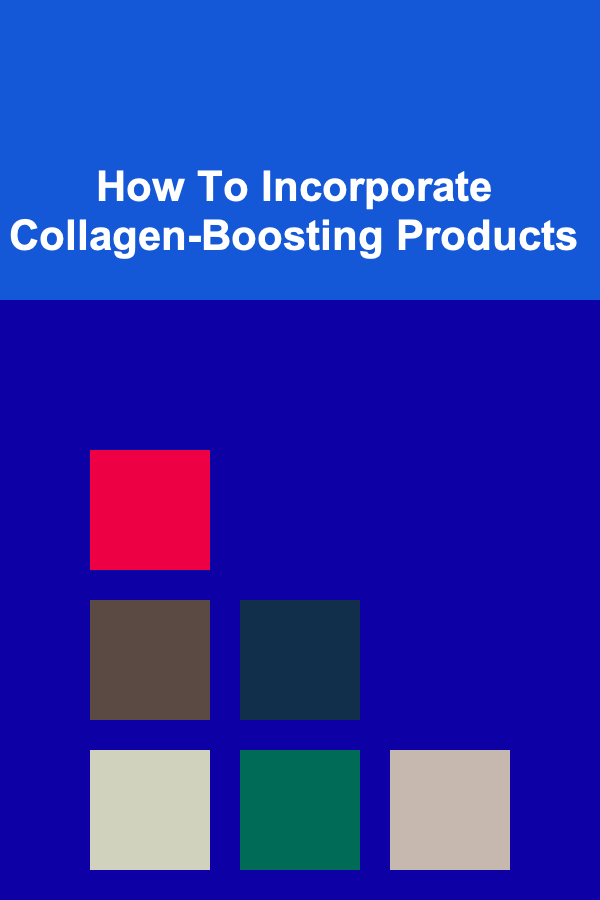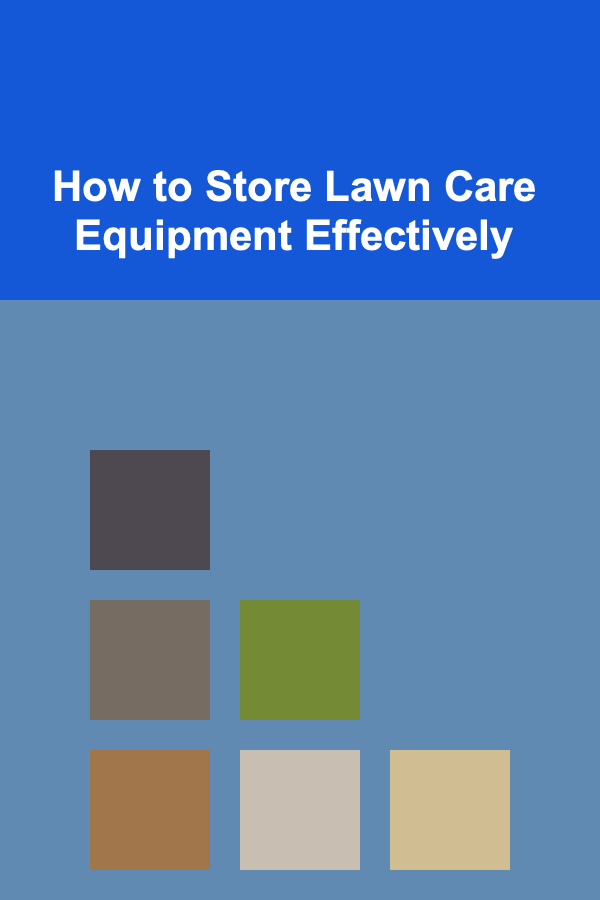
How To Incorporate Collagen-Boosting Products
ebook include PDF & Audio bundle (Micro Guide)
$12.99$6.99
Limited Time Offer! Order within the next:

Collagen is a vital protein found in our bodies, playing an essential role in maintaining the structure and elasticity of our skin, joints, bones, and other connective tissues. As we age, our natural collagen production decreases, leading to visible signs of aging, such as wrinkles, sagging skin, and joint discomfort. This has led to the rise of collagen-boosting products, which claim to stimulate the production of collagen or help replenish it from external sources.
The global skincare and wellness industries have embraced collagen-boosting products, making them widely available in various forms, including topical creams, serums, supplements, and even collagen-enriched foods. But how exactly can we incorporate collagen-boosting products into our daily routines for maximum effectiveness? In this article, we will explore the importance of collagen, how collagen-boosting products work, and the best ways to incorporate them into your lifestyle.
The Importance of Collagen
Collagen is the most abundant protein in the human body, making up around 30% of the total protein content. It provides structural support to tissues and helps maintain their elasticity. Collagen is composed of amino acids, with glycine, proline, and hydroxyproline being the most prominent. These amino acids form a triple helix structure that gives collagen its strength and flexibility.
The primary functions of collagen include:
- Skin Health: Collagen contributes to skin elasticity, hydration, and firmness. It helps reduce the appearance of wrinkles and fine lines.
- Joint Health: Collagen supports the integrity of cartilage, which is the tissue that protects the joints. A reduction in collagen can lead to joint pain and inflammation.
- Bone Health: Collagen is a crucial component of bone structure. It gives bones flexibility and strength.
- Hair and Nail Growth: Collagen contributes to the health of hair follicles and nails, supporting their strength and growth.
- Wound Healing: Collagen plays a vital role in tissue repair and wound healing by promoting the formation of new skin cells.
As we age, collagen production naturally slows down, typically beginning in our late 20s. By the time we reach our 40s and beyond, the body's ability to produce collagen declines significantly, leading to signs of aging such as wrinkles, sagging skin, and joint discomfort. This has led many people to turn to collagen-boosting products in an attempt to combat the effects of aging and maintain youthful-looking skin and healthy joints.
Understanding Collagen-Boosting Products
Collagen-boosting products are designed to either stimulate the body's natural collagen production or introduce collagen directly into the system. These products can be broadly categorized into two types: topical treatments and oral supplements.
Topical Collagen-Boosting Products
Topical products, such as creams, serums, and masks, are designed to be applied directly to the skin. They often contain ingredients that stimulate collagen production or protect existing collagen from degradation. While these products don't directly add collagen to the skin, they can help maintain and support the skin's natural collagen production.
Some common ingredients in topical collagen-boosting products include:
- Vitamin C: Known for its ability to stimulate collagen production, vitamin C is a potent antioxidant that can help protect collagen fibers from damage caused by free radicals. It also plays a crucial role in the synthesis of collagen by promoting the conversion of proline to hydroxyproline, a key amino acid in collagen.
- Retinoids (Vitamin A): Retinoids are well-known for their ability to stimulate collagen production and accelerate skin cell turnover. They work by increasing the production of new skin cells, which can improve the texture and appearance of the skin.
- Peptides: Peptides are short chains of amino acids that can penetrate the skin and signal cells to produce more collagen. Some peptides, such as copper peptides, have been shown to enhance collagen synthesis and improve skin elasticity.
- Hyaluronic Acid: While not directly involved in collagen production, hyaluronic acid helps to keep the skin hydrated. This can support the skin's overall appearance and allow for the effective functioning of collagen fibers.
Oral Collagen Supplements
Oral collagen supplements, such as collagen powders, capsules, and drinks, contain hydrolyzed collagen, which is broken down into smaller peptides that are more easily absorbed by the body. These supplements aim to replenish collagen levels in the body and stimulate the production of new collagen.
The most common types of collagen used in supplements are:
- Type I Collagen: Found primarily in the skin, bones, and tendons, type I collagen is the most abundant type in the body. It is often used in supplements for skin health and anti-aging benefits.
- Type II Collagen: Found in cartilage, type II collagen is commonly used in joint health supplements to help reduce inflammation and support joint mobility.
- Type III Collagen: Often found alongside type I collagen, type III is found in the skin, muscles, and blood vessels. It is beneficial for supporting skin elasticity and overall tissue health.
When consumed, collagen supplements are broken down into amino acids, which are then used by the body to repair and rebuild collagen fibers. Some studies have shown that collagen supplements can improve skin elasticity, hydration, and reduce the appearance of wrinkles. They may also help with joint health by supporting cartilage and reducing pain and inflammation.
Collagen-Boosting Foods
In addition to topical and oral products, incorporating collagen-boosting foods into your diet can support natural collagen production. These foods provide the essential nutrients required for collagen synthesis and help promote skin, joint, and bone health.
Some collagen-boosting foods include:
- Bone Broth: Bone broth is rich in collagen and amino acids, including proline and glycine, which are essential for collagen production. Drinking bone broth regularly can provide the body with the building blocks needed for collagen synthesis.
- Leafy Greens: Vegetables like spinach, kale, and Swiss chard are rich in antioxidants and vitamin C, both of which are essential for collagen production.
- Berries: Berries like strawberries, blueberries, and raspberries are packed with vitamin C, which plays a crucial role in collagen production.
- Eggs: Eggs are an excellent source of amino acids, particularly proline, which is essential for collagen formation.
- Garlic: Garlic contains sulfur, a mineral that is important for collagen production and the overall health of connective tissues.
Incorporating these foods into your diet can provide a natural boost to collagen production and support the overall health of your skin and joints.
How to Incorporate Collagen-Boosting Products into Your Routine
To maximize the effectiveness of collagen-boosting products, it is essential to incorporate them strategically into your daily routine. Here are some tips on how to do that:
1. Start with a Consistent Skincare Routine
For topical collagen-boosting products, consistency is key. A good skincare routine should include the following steps:
- Cleansing: Cleanse your face with a gentle cleanser to remove dirt, oil, and makeup. This helps prepare your skin to absorb the active ingredients in collagen-boosting products.
- Exfoliating (Optional): Exfoliating once or twice a week can help remove dead skin cells and promote skin regeneration. This allows collagen-boosting products to penetrate deeper into the skin.
- Applying Serums and Treatments: Apply collagen-boosting serums, peptides, or retinoid products to clean skin. These should be used after toning and before moisturizing.
- Moisturizing: Use a moisturizer to lock in hydration and help maintain the skin's elasticity. Look for products that contain hyaluronic acid, which can support collagen's function.
You should aim to apply these products consistently, ideally in the morning and evening, to see the best results over time.
2. Take Collagen Supplements Regularly
If you're using oral collagen supplements, it's important to take them regularly for optimal results. While the exact dosage may vary depending on the product, most studies suggest a daily dose of 2.5 to 15 grams of collagen peptides. These supplements can be taken in various forms, such as:
- Powder: Collagen powder can be mixed into smoothies, coffee, or water. It's an easy and convenient way to incorporate collagen into your daily routine.
- Capsules: Collagen capsules are another popular option. They are easy to take but may take longer to digest and absorb compared to powders.
- Drinks: Collagen-infused beverages, such as flavored collagen water or ready-to-drink collagen shakes, are available for those who prefer a more convenient, on-the-go option.
It's important to note that it may take a few weeks or even months to see noticeable changes in your skin or joints after starting collagen supplementation. The benefits are cumulative, so patience and consistency are essential.
3. Add Collagen-Boosting Foods to Your Diet
Incorporating collagen-boosting foods into your diet doesn't require a complete overhaul of your eating habits. You can start by adding a few key items to your meals:
- Add a serving of bone broth to your soup or stew.
- Incorporate leafy greens and berries into your smoothies or salads.
- Snack on nuts, seeds, and eggs for a collagen-boosting boost throughout the day.
By incorporating these foods into your meals, you'll be providing your body with the necessary nutrients to support collagen production.
4. Combine Products for Maximum Effect
For the best results, you can combine topical collagen-boosting products, supplements, and collagen-boosting foods. This multi-faceted approach ensures that you're supporting collagen production both externally and internally.
For example, use a vitamin C serum in the morning to promote collagen synthesis in the skin, take a collagen supplement daily to support overall body collagen levels, and consume collagen-boosting foods to provide the body with the nutrients it needs for collagen formation.
Conclusion
Collagen is an essential protein that provides structural support to the skin, joints, bones, and other connective tissues. As we age, our natural collagen production declines, leading to the visible signs of aging. Collagen-boosting products, such as topical treatments, oral supplements, and collagen-rich foods, can help stimulate collagen production or replenish collagen stores in the body.
By incorporating these products into your daily routine---whether through skincare, supplementation, or diet---you can support your body's collagen production and maintain youthful skin, healthy joints, and overall well-being. Remember, consistency is key, and results may take time. With patience and the right combination of products, you can unlock the benefits of collagen-boosting strategies and achieve your wellness and beauty goals.

How to Clean Windows Like a Pro
Read More
How to Manage Pet Waste in a Small Home
Read More
How to Renovate Your Home for Better Natural Lighting
Read More
How to Store Lawn Care Equipment Effectively
Read More
Why You Need to Create a Shoe Storage Solution
Read More
How to Create a Scrapbooking Planner Budget
Read MoreOther Products

How to Clean Windows Like a Pro
Read More
How to Manage Pet Waste in a Small Home
Read More
How to Renovate Your Home for Better Natural Lighting
Read More
How to Store Lawn Care Equipment Effectively
Read More
Why You Need to Create a Shoe Storage Solution
Read More